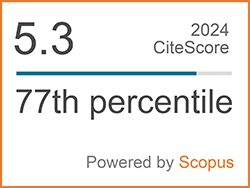Binary Integer Programming Approach to Optimal Content Placement in Cloud-based Content Delivery Networks
Abstract
Over the last decades, Content Delivery Networks (CDNs) have been developed to overcome the limitation of user perceived latency by replicating contents from origin server to its content servers around the globe close to clients. As some contents occupy most of the storage capacity and processing power in traditional private content servers, cloud computing can provide a pool of storage and processing power resources for caching contents. By adopting cloud computing to CDN, the content provider can use the cloud infrastructure by distributing the contents to cloud servers which will then deliver to near clients. In this paper, we propose a cloud-based CDN framework designed by two schemes 1) UDP/TCP-based content distribution from origin server to cloud servers and 2) SDN-based cloud server coordination. In addition, we also formulate the optimal content placement problem using binary integer programming to minimize the total cost of renting resources including storage, processing power, and network bandwidth in cloud providers for hosting contents from origin server. Then, the optimal solution obtained from binary integer programming is evaluated by greedy algorithm and simulations. The proposed framework helps content provider to offer high quality of services to clients while minimizing the cost of rented cloud resources.
Keywords
[1] Z. Xu, Y. Hu, and L. Bhuyan, “Efficient server cooperation mechanism in content delivery network,” presented at the IEEE International Conference Performance Computing and Communications, Phoenix, USA, Apr. 10–12, 2006.
[2] Akamai, “Security, cloud delivery, performance,” 2019. [Online]. Available: https://www.akamai.com/
[3] Limelight Network, “Content Delivery Network (CDN) service provider,” 2019. [Online]. Available: https://www.limelight.com
[4] CoDeeN, “A CDN on PlanetLab,” 2019. [Online]. Available: http://codeen.cs.princeton.edu/
[5] M. Wang, P. Jayaraman, R. Ranjan, and K. Mitra, “An overview of cloud-based content delivery networks: Research dimensions and state-of-theart,” in Transactions on Large-Scale Data- and Knowledge-Centered Systems XX, Berlin, Germany: Springer, 2015, pp. 131–158.
[6] V. Mathew, R. Sitaraman, and P. Shenoy, “Energy-efficient content delivery networks using cluster shutdown,” in Proceedings Green Computing, 2013, pp. 1–10.
[7] R. Allan Alimi, L. Chen, D. Kutscher, H. Liu, A. Rahman, H. Song, R. Yang, D. Zhang, and N. Zong, “An open content delivery infrastructure using data lockers,” in Proceedings ICN Workshop on Information-centric Networking, 2012, pp. 25–30.
[8] H. Xiong, X. Zhang, D. Yao, X. Wu, and Y. Wen, “Towards end-to-end secure content storage and delivery with public cloud,” in Proceedings Data and Application Security and Privacy, 2012, pp. 257–266.
[9] S. Srinivasan, J. Lee, D. Batn, and H. Schulzrinne, “ActiveCDN: Cloud computing meets content delivery networks,” Columbia University, New York, Computer Science Tech. Rep. CUCS-045-11, Nov. 2011.
[10] A. Blair, G. Parr, P. Morrow, B. Scotney, A. McConnell, S. Appleby, and M. Nilsson, “Cloudbased dynamically provisioned multimedia delivery: An elastic video endpoint,” in Proceedings Cloud Computing, GRIDs, and Virtualization, 2012, pp. 260–265.
[11] E. He, J. Leigh, O. Yu, and T. Defainti, “Reliable blast UDP: Predictable high performance bulk data transfer,” in Proceedings Cluster Computing, 2002, pp. 1–8.
[12] Y. Wu, Z. Zhang, C. Wu, C. Guo, Z. Li, and F. Lau, “Orchestrating bulk data transfers across geo-distributed datacenters,” IEEE Transactions on Cloud Computing, vol. 5, no. 1, pp. 112–125, Jan. 2015.
[13] M. P. Sarma, “Performance measurement of TCP and UDP using different queuing algorithm in high speed local area network,” International Journal of Future Computer and Communication, vol. 2, no. 6, pp. 682–686, Dec. 2013.
[14] W. Han, H. Hu, and G. Ahn, “LPM: Layered policy management for software-defined networks,” in Proceedings 28th Annual IFIP WG 11.3 Working Conference on Data and Applications Security and Privacy, 2014, pp. 1–9.
[15] GAMS, “Optimization Solvers,” 2019. [Online]. Available: https://www.gams.com/optimizationsolvers/
[16] A. Malik, N. Goyat, and V. Saroha, “Greedy algorithm: Huffman algorithm,” International Journal of Advanced Research in Computer Science and Software Engineering, vol. 3, no. 7, pp. 296–303, Jul. 2013.
DOI: 10.14416/j.asep.2021.01.006
Refbacks
- There are currently no refbacks.
 Applied Science and Engineering Progress
Applied Science and Engineering Progress







